The full, £6.99 version of Papers, Please hit Steam on the 8th August, and is an indie title well worthy of discussion. The largely positive response is quite striking when matched to gameplay that appears somewhat mundane – am I missing something?
• Developer: Lucas Pope
• Reviewed on: PC
• Release Date: August 8th 2013

During the winter months of 1982 you will take on the charge of fictional Arstotska’s border, admitting those that have correct documentation and sending away those that don’t. It’s hardly the makings of a hugely exciting story, and has a strongly repetitive nature. You effectively do the same thing every day you play through; admitting characters, checking over their details, responding to any anomalies. The game’s progression results in further challenges you must react to, such as an increase in terrorist attacks requiring a search of all Kolechia occupants before they enter the country. The first negative aspect you recognise is in this initial gameplay, where your actions are reduced to merely checking a person’s country of origin and stamping their passports. The important thing is to stick it out, because the real decision-making comes into play a bit later in the game. Do you report the man that’s been revealed to be a pimp by a girl further in the queue to the authorities, or do you admit him, minding your own business, with your family’s monetary need on your mind? Do you take pity on the scatterbrained man who’s come to your booth four times previously and give him the green stamp, if only to stop him from pestering you?
When the same man comes to your counter on various days, trying to cross the border with a passport that looks like it’s been drawn in crayon, it’s undoubtedly humorous, even if only for musing whether this has ever been attempted in real life. His enthusiasm and lack willingness to accept of defeat is quite wonderful though (“Hey it is me! Are you happy to see?”) although, there’s a fine line between jolliness and desperation, and one that’s hard to ignore, especially in this game.
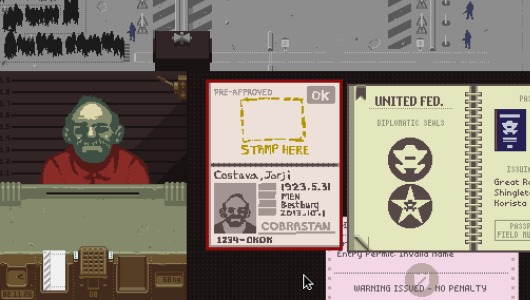
I wouldn’t say that looks legit.
My first impression was that Papers, Please is a darkly comical take on a serious topic, presenting the extremities of totalitarian societies through the slightly absurd nature of the characters you meet and the strongly mundane life you, as the immigration officer, lead. Yet the alternative take on this simple puzzle game begins to open up the more you play it, specifically the more you immerse yourself and consider your actions. Could it be that the intention of Lucas Pope, the game’s developer, is to present a philosophical debate amongst the game’s audience?
Perhaps so, as the game does alter as you progress, and the longer you work, the more regulations you must follow. Rather than checking over a passport as on Day One, a week later you’ll find yourself checking over ID cards, asking about the reason for their visit, and even invading their privacy by strip-searching them for weapons. If you find something suspect, you can detain the individual until they are removed by guards, despite their possible plea that the items you found were medical. This turns the game’s mood a bit sour. Rather than plodding along, checking passport photos and trying to get your ‘Approved’ stamp to fit nicely inside the VISA box, you take something of a step back and consider the unfeeling nature of the role you’re playing, effectively treating these characters as merely part of a process. When you do, the game’s dark nature becomes a whole lot darker.
At the end of each day, the player can decide what to spend his meagre wages on; and the list isn’t exactly jolly. Will you spend some money on heating, to ensure your family is warm and comfortable? Or leave that for now, making up for the cold by providing a decent meal? It’s hard to weigh up these options when you have to factor in your son’s new illness, caused by cold temperatures or hunger. Do you buy medicine, or attend to concerns of the family as a whole?
It becomes increasingly morally difficult when your duties at home intermingle with your work responsibilities.. Especially with some of the shadier characters that wander through border control. Whilst your decision to accept or deny a bribe to allow a man carrying a weapon into Artstotska might not affect your own moral regard (I was more thinking along the lines of “hey, I could use the money!”), it’s not too difficult to see how it could to a small degree. Do you run the risk of a penalty notification sliding onto your desk, just to secure a bit extra to afford some medicine for your son, or do you stay committed to your job at hand, feeling torn between following your work rules or sticking it to the unimpressive wage you receive?
The impact of this game and small indie titles like it are impressive. It’s easy to lose attention within the first half hour of play, but you definitely benefit from continuing through the monotonous actions; the interesting part is the underlying, eye-opening message. After all, it lacks what could be considered exciting gameplay, yet it’s repetition and dullness contributes to its oppressive atmosphere, so much so that you could say it’s deliberate.
However, a solely-puzzle solving experience can be sought through the Papers, Please Endless game mode. Unlocking the mode can prove to be difficult when the game has numerous possible endings, and is perhaps most rewarding for completionists and those that found the game’s basic detail-spotting genuinely fun. The Timed and Perfection modes add a bit of extra gameplay to appreciate, introducing a time-trial of 10 minutes to process travellers in, whilst the Perfection game mode is over when you hit your first penalty, adding a bit more of a challenge.
If you’re still unsure about Papers, Please, I would recommend taking a quick look at developer Lucas Pope’s other works. The Republia Times, a free-to-play in-browser game presents a similar air of mild boredom — easing in its simple and repetitive nature. Charged with the task of controlling what Republia newspaper articles to publish, the player acts in a commanding role over a fictional community that increasingly seem like a conformist herd, and it’s hard to ignore this slightly uncomfortable level of control in what is similarly quite a dark concept. As in Papers, Please, the player is presented with interesting moral choices in regards to loyalties; those to their job and the security of their family, or loyalty to freedom and the greater public. Depending on how you want to play, you could again experience more than a simple puzzle game.
Lucas Pope has combined familiarly basic 2D graphics, a greatly-fitting and atmospheric soundtrack and a thought provoking game concept into Papers, Please, a game that is worth experiencing if only for curiosity, as it definitely brings something new.
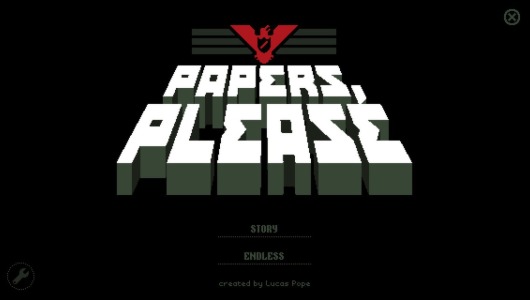
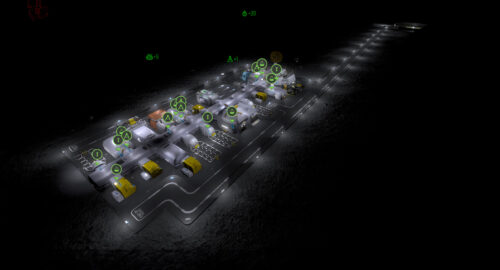

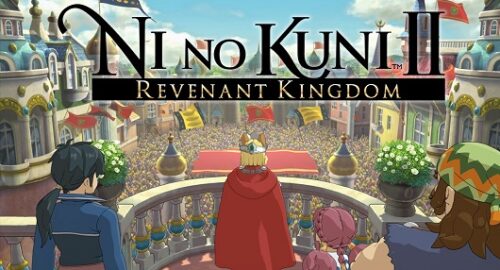


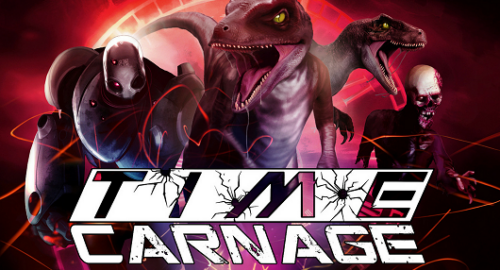
Glowbear
nice review. it’s getting a lot of raves from people, but from what I’ve seen a 3/5 would be roughly what I’d expect ti really deserve.
ThaJM
Back when “Papers, Please” was in beta, i had played a version of it that lasted 10 in-game days. Not too sure how much that version differs from the completed product, but i did not enjoy it much.
The “spot the difference” gameplay was fun, up to a certain point. But it quickly devolved to a chore for me, an anxious one at that. Fretting over the family, i would strive to process as many people as i could. The game then decides to introduce an ever-increasing amount of paperwork to pore over for irregularities. This was all accompanied by a drab aesthetic that further put me in a sour mood.
The creator of this game is clearly trying to put forth a particular experience, one that goes against my personal gaming ethos. I play games to have fun, to have experiences not found in reality.
Thanks for the review Kathi, though could i suggest breaking up the text more often? The wall of text that follows after the first picture made the review a bit hard to read. Welcome to Bigredbarrel!